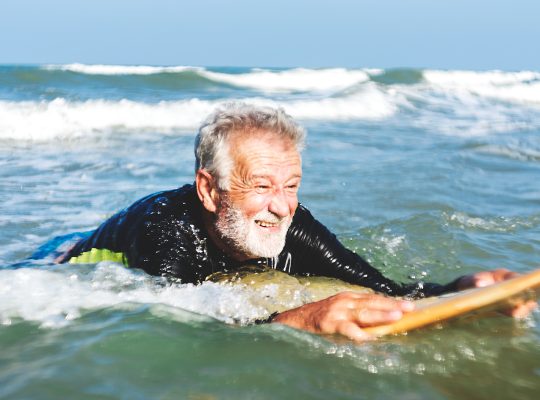From deafening concert halls to long rehearsals in small studios – for many musicians, sound is not an afterthought, but the core of their existence. This is precisely why hearing loss hits extra hard. Because what if you can no longer hear your music properly? Or when a constant beeping disturbs your concentration?
Hearing problems in musicians are more common than you might think. Fortunately, there are many ways to prevent damage – and to continue if you do experience symptoms. In this blog you will read how musicians can protect their hearing without compromising on quality.
Musicians and hearing: a risky combination
Whether you are a drummer in a rock band, first violin in an orchestra or DJ at festivals – as a musician, you are often exposed to high volumes. Day in and day out. Noise levels during rehearsals and performances can easily exceed 100 decibels. And anything over 85 decibels can cause hearing damage with prolonged exposure.
The danger is not only in volume, but also in duration and frequency. A sound spike of ten minutes a day seems harmless, but every day it adds up. Especially if you are also practicing, mixing, listening, editing or teaching.
Common hearing problems in musicians
Musicians are more likely to:
- Tinnitus: a constant squeak, hiss or noise in your ear.
- Hearing loss: usually in the high notes, making music sound duller.
- Hyperacusis: hypersensitivity to sound in which normal volumes are perceived as painful or annoying.
- Impaired tone perception: tones or harmonies sound different or false.
These symptoms usually develop gradually. It starts with a squeak after a performance, or difficulty distinguishing details in a mix. The earlier you get there, the more you can do to prevent worsening.
Why hearing protection is often omitted from musicians
Many musicians hesitate to wear hearing protection. The main objections:
- “I don’t hear myself playing well anymore.”
- “It changes the sound of my instrument or singing.”
- “It feels uncomfortable or doesn’t sit well.”
- “It’s not cool – no one in the band wears it.”
Yet it is not so black and white. Thanks to technological advances, there are now special earplugs and customized solutions that do not distort the sound, but do attenuate it to a safe level. This keeps the musical experience intact – but without damage.
What can you do to prevent hearing problems?
Fortunately, as a musician, you don’t have to compromise on your passion. With the right approach, you can protect your hearing and continue to perform at your best.
1. Invest in good hearing protection
Choose earplugs with a music filter or have custom-made earplugs. These provide flat attenuation: the volume goes down, but the sound remains clear and balanced. Ideal for rehearsals, performances and even studio work.
There are also special in-ear monitors with hearing protection, used on stage. With these, you hear exactly what you need, at a safe volume.
2. Limit your exposure
Try to make smart choices in your schedule. Alternate loud sessions with quiet moments, wear earplugs at rehearsals and performances, and take regular sound breaks. Short moments of rest also help your ears recover.
3. Get a good setup
Set up your amplifiers, monitors and instruments so that you are not constantly in the sound cannon. Use sound-absorbing panels in your practice space to reduce reverberation. Get advice from a sound engineer if necessary.
4. Get your hearing tested regularly
A hearing test is not necessary only when you have symptoms. As a preventive check it is valuable to know how your hearing is doing. Many audicien or specialized audiological centers can offer musicians a comprehensive test.
5. Take complaints seriously
Do you suffer from tinnitus, pressure in your ears, distorted sounds or fatigue after a performance? Don’t ignore it. These are signs that your ears are overloaded. Give them a rest, avoid loud noises and seek help if necessary.
What if you already have hearing damage?
Hearing damage is usually irreversible. But that doesn’t mean you can no longer make music. Indeed – many well-known musicians have continued to play with (adapted) aids.
Possible solutions:
- Hearing aids: modern models can be tailored to musical preferences and even include special music profile.
- Tinnitus masking: devices or apps that produce a soothing sound to soothe the squeak in your ear.
- Professional guidance: audiologists and music therapists can help find the right balance between hearing protection and musical experience.
The important thing is to keep listening – to your hearing as well as to yourself.
Well-known musicians with hearing problems
You are not alone. Many well-known artists openly share their experience with hearing damage:
- Chris Martin (Coldplay): struggles with tinnitus and always wears hearing protection.
- Eric Clapton: spoke openly about his hearing loss from years of exposure to amplified sound.
- Barbara Streisand: suffers from hyperacusis.
- Will.i.am: lives with a constant beep in his ear.
Their message is clear: prevention is better than cure – and hearing protection does not make you any less musical. On the contrary.
Play with passion, listen with care
As a musician, your hearing is your most important instrument. It is the key to expression, nuance and connection. That is precisely why it deserves the best protection. With earplugs that do sound good, with plenty of rest, and with the courage to discuss hearing problems.
Keep enjoying music – on stage, in the studio or in the rehearsal room – but make sure you can still hear it tomorrow.
Looking for hearing protection designed specifically for musicians? In our webshop, you’ll find high-quality earplugs with music filters, custom options and accessories for protection as well as comfort. Discover what suits your instrument, style and hearing.








